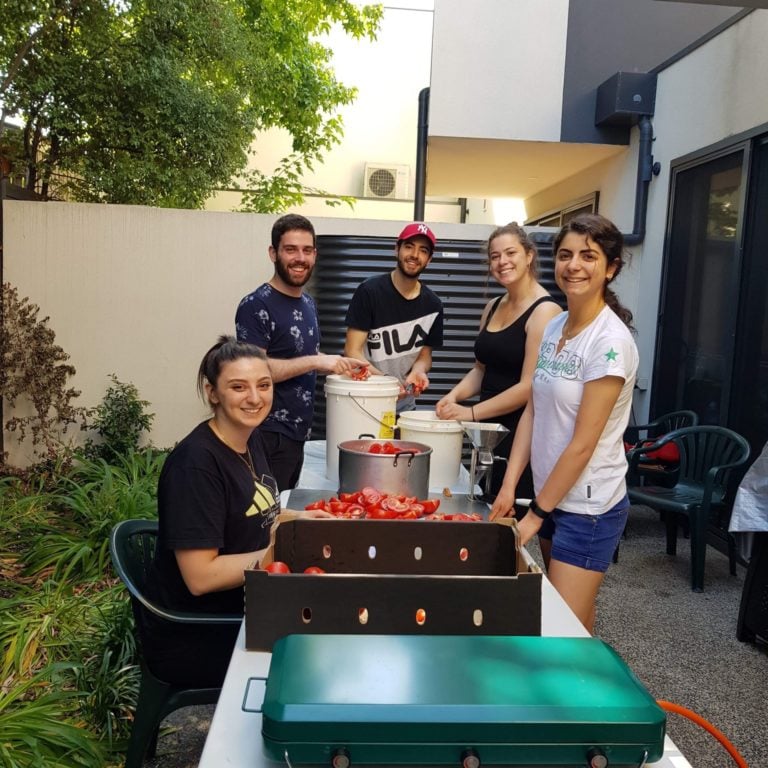Memories abound of big Greek family picnics, with bags packed to the brim with Tupperware full of tiropites, keftedes and a multitude of other traditional favourites.
Perhaps the biggest celebration of the intersection of Greek families and food is Orthodox Easter, from learning how to cook dishes during the 40 day fast, to enjoying the company of our loved ones with the big Sunday feast.
We even have the Mediterranean diet heralded as one of the healthiest in the world, so what’s not to love?
We spoke to NUGAS Victoria member Georgia Giatrakos and alumni Adriana Savva on why they think the relationship between food and family such a big cornerstone of Greek culture.
Adriana Savva

I have always found Greek food culture to be unique in its ability to bring people together both within and outside the family unit. To me, it holds the basis to create new relationships and strengthen pre-existing ones. Food is a celebration to solidify traditions across generations, particularly at Easter and Christmas time.
The fondest memories I have are those with my yiayia and pappou making traditional bakes, souvla and desserts, particularly flaounes where I would get a small portion of dough to make bread rolls as a child.
It is here they would tell their stories about their youth, their migration to Australia and their families they left behind. Whilst they have not returned to visit for many years, I feel the connection to their home through food. Whether they are cooking a simple dinner or preparing for a large scale party, it serves as a reminder to their upbringing each and every day.
Whilst many young Greek-Australians may not be able to speak Greek fluently, or dance/listen to traditional music, food has become an anchor to their culture. Perhaps this is why food has become such an imperative part of the Greek culture; it has minimal to no barriers. Anyone can pick up a cookbook or search for a recipe online and learn how to cook traditional Greek food.
I have noticed how food culture has changed from our grandparent’s generation to ours. From the technology used to the metric measurements (me to mati, or oti xriasi), the underlying passion and love will forever remain so long as we remember where they came from. I hope to one day pass on these traditions and lessons to my children and grandchildren.
Georgia Giatrakos

Two important things that come to mind that are embedded within the Greek culture are food and family. We tend to come together and create memories around the kitchen table.
Whether it’s having a small mezze or an abundance of Greek food, each gathering is an opportunity to share stories and enjoy one another’s company while talking and eating for hours.
Having a special connection with my grandparents has been an integral part of my upbringing. Pappou would share stories about his time in Greece while yiayia would be in the kitchen cooking up a storm with the fresh vegetables and herbs picked from their garden.
My yiayia has many traditional Greek recipes that have been handed down from generation to generation, however during each step of her recipe most things are done ‘me to mati’.
Most Greeks tend to have large families and enjoy getting together to celebrate special occasions like birthdays, name days and Christmas. One major celebration on the calendar is Greek Easter. In preparation for Easter we dye red eggs, make tsourekia and bake koulouria ready for Easter Sunday. This usually leads to having a Greek style buffet with the traditional lamb on the spit and many other Greek foods and desserts. Keeping this Greek tradition, preserves the relationship between food and family.
One thing that resonates with me is that Greek people are very hospitable and you will never leave feeling hungry or empty handed. When visiting a Greek home, coffee, kourabiethes and spoon sweets ‘glyko tou koutaliou’ are offered. Greeks do not just cook for 10 people, they cook enough to feed a whole village resulting in leftovers.
Connecting with family and cooking traditional Greek recipes is a way to stay connected to our Greek culture that can be maintained and passed to the next generation.









